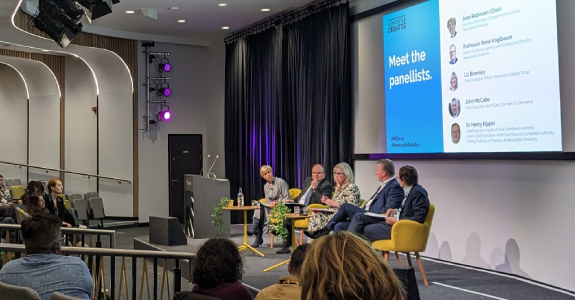The North East devolution deal, agreed in December 2022, marks a new devolution agreement between the government and the local authorities of Northumberland, Newcastle, North Tyneside, Gateshead, South Tyneside, Sunderland, and County Durham.
Meeting the needs of our economy
At a special panel, the latest in the series of Newcastle Debates, key representatives discussed how the new deal could impact skills and employment in the North East.
It is expected that an election to appoint a new mayor will take place in May 2024, at which point the new North East Mayoral Combined Authority will come into effect.
The value of the North East devolution deal is being put at £4.2bn and is said to be the most generous per head in England. The deal transfers new powers investment over 30 years, which will enable a new Mayoral Combined Authority to plan for the long term and unlock the benefits of devolution for 2 million people living in our region.
Expert insight
Chaired by Professor Jane Robinson, the University's Pro-Vice-Chancellor for Engagement and Place, the panel comprised:
- Professor René Koglbauer, Dean of Lifelong Learning and Professional Practice, Newcastle University;
- Liz Bromley, Chief Executive Officer, Newcastle College Group;
- John McCabe, Chief Executive, North East Chamber of Commerce;
- Dr Henry Kippin, Chief Executive, North of Tyne Combined Authority; Interim Chief Executive, North East Mayoral Combined Authority
In the debate (which you can view above), the panel considered how we ensure we have the right skills to meet the needs of the future economy and how such opportunities be open to all. They also examined whether regional devolution can address the employment challenges facing the North East's diverse urban, rural and coastal communities.

Newcastle Debates
Newcastle Debates is a series of events hosted by Newcastle University giving you an opportunity to hear from - and directly engage - the key figures responsible for shaping the future of our city and region.
Our panellists are drawn from academic experts, local government officials, MPs, the NHS and representatives from public, private and third sector organisations.

